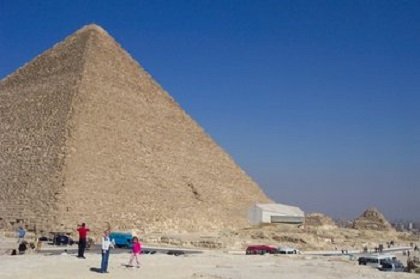CNN — Worsening violence amid anti-government protests in Egypt has led western governments step up their travel advice.
Yesterday, at least 23 people were killed, and hundreds injured, in clashes between supporters and opponents of Egyptian President Mohamed Morsy at Cairo University.
Since then, the British Foreign and Commonwealth Office is recommending “against all but essential travel to Egypt” except certain coastal resorts, where unrest is less evident.
Previously, the FCO advised travelers only to steer clear of “all demonstrations and large gatherings” within the country.
The U.S. State Department continues to advise against all “non-essential” travel to or within Egypt.
Tourism minister quits
Egypt’s tourism industry suffered another blow Monday with the resignation of the country’s tourism minister, Hisham Zazour.
Zazour handed in his resignation along with five other ministers, including the foreign minister, over the violence sweeping the country.
The present crisis was the last straw for a man with one of the toughest jobs in tourism. He had threatened to quit last month over the appointment as Luxor governor of a member of a political group associated with a massacre in the city 15 years ago that killed 58 tourists.
Tourism vital
The pyramids of Giza, the Nile and the coastal resorts of Sharm-el-Sheikh are among the world’s most popular tourist attractions. The industry is vital to Egypt’s economy.
Tourism employs around 10% of the Egyptian workforce and brought in $10 billion in 2012, according to UNWTO figures.
However, anti-government protests beginning in 2011, part of the revolutionary movement sweeping the Middle East, have hit tourism hard. Visitor numbers have fallen by almost one-third, from 14 million in 2010 to 10.5 million last year.
Will travelers still go?
Should travelers still visit Egypt? There have been bargains aplenty as travel operators have tried to woo back tourists to what has long been one of the world’s most popular sun-sea-and-sights destinations.
Yet official travel advice is hardening — while stopping short in all cases of advising against all travel or assisting foreigners to leave Egypt.
In addition to deaths at public demonstrations, the British government notes reports of “more than forty rapes and sexual assaults of Egyptian and foreign women.”
Coastal resorts “safe”
Yet the Foreign and Commonwealth Office exempts “resorts on the Red Sea in South Sinai” and certain mainland resorts from its advice against travel. It continue to state that “most visits” to Egypt are trouble-free.
It is true that, as protests have surged and dwindled over the past two years, violence has largely been confined to Cairo and other cities, rather than the coastal resorts popular with package holiday tourists.
“July and August traditionally see lower numbers of holidaymakers traveling to Egypt than the rest of the year,” the Association of British Travel Agents told CNN Travel Tuesday.
“At this stage, outside of Cairo it is very much business as usual, and holiday makers are enjoying their holidays without interruption.”
U.S. citizen dies
In stronger advice than Britain’s, the U.S. government recommends against all “non-essential” travel to Egypt. A U.S. citizen, Andrew Pochter, 21, died after being stabbed in the chest at a protest in the city of Alexandria last Friday.
Political unrest in Egypt is “likely to continue in the near future,” the State Department says.
Whatever the political outlook for the country, its vital tourism industry is likely to take years to recover from its violent recent history.
